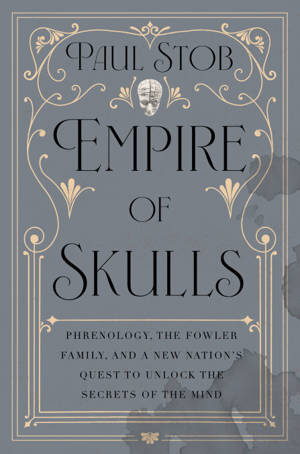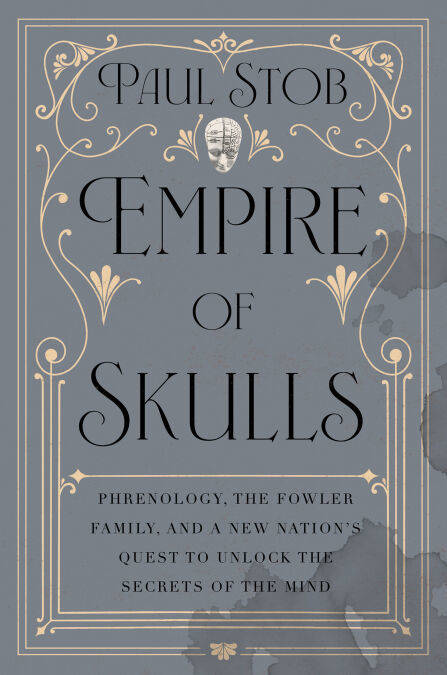
- Retrait gratuit dans votre magasin Club
- 7.000.000 titres dans notre catalogue
- Payer en toute sécurité
- Toujours un magasin près de chez vous
- Retrait gratuit dans votre magasin Club
- 7.000.0000 titres dans notre catalogue
- Payer en toute sécurité
- Toujours un magasin près de chez vous
Empire of Skulls EBOOK
Phrenology, the Fowler Family, and a New Nation's Quest to Unlock the Secrets of the Mind
Paul Stob
Ebook | Anglais
29,56 €
+ 29 points
Format
Description
This fascinating history of phrenology reveals how one family, despite their flawed framework, helped shape early understanding of the human mind—reflecting both the limits of early science and the ongoing evolution of scientific inquiry
For readers of The Immortal Life of Henrietta Lacks, The Emperor
of All Maladies, and Radium Girls
Today, everyone remembers phrenology—the study of the formation of the skull as indicative of mental faculties and traits of character—as pseudoscientific at best and racist at worst. And it most certainly contains elements of both. But, as author Paul Stob presents in Empire of Skulls, phrenology also has the unique distinction of marking the birth of the self-help movement, right alongside the birth of our country.
The science of phrenology was premised on a simple yet revolutionary idea: The bumps, spans, and masses on your head mirror those on your brain, and they are the keys to your past, present, and future. Discovered in Europe in the late-eighteenth century and promulgated across the U.S. in the decades before the Civil War, phrenology captured the imagination of millions of Americans thanks largely to the efforts of one family: the Fowlers.
Viewing the science as essential to personal and social advancement, siblings Orson, Lorenzo, and Charlotte Fowler set about transforming American life by unlocking the secrets of skulls. Year after year, the Fowlers:
Delivered lectures from Maine to the Great Plains Performed hundreds of thousands of hands-on character examinations Created a wildly popular tourist attraction, the Phrenological Cabinet, in New York City Established a preeminent publishing firm, Fowlers and Wells And they examined the heads of the full range of humans—pirates, murderers, rapists, thieves, prisoners, and the insane, as well as presidents, statesmen, inventors, activists, writers, artists, and, most importantly, ordinary Americans
These efforts led first to a profitable business, then to a cultural movement, and finally to an empire of influence—one built on the promises and perils of human skulls. Though their names are seldom remembered today, this entertaining and absorbing read shows how their empire reshaped American life at a pivotal time in the nation’s history.
For readers of The Immortal Life of Henrietta Lacks, The Emperor
of All Maladies, and Radium Girls
Today, everyone remembers phrenology—the study of the formation of the skull as indicative of mental faculties and traits of character—as pseudoscientific at best and racist at worst. And it most certainly contains elements of both. But, as author Paul Stob presents in Empire of Skulls, phrenology also has the unique distinction of marking the birth of the self-help movement, right alongside the birth of our country.
The science of phrenology was premised on a simple yet revolutionary idea: The bumps, spans, and masses on your head mirror those on your brain, and they are the keys to your past, present, and future. Discovered in Europe in the late-eighteenth century and promulgated across the U.S. in the decades before the Civil War, phrenology captured the imagination of millions of Americans thanks largely to the efforts of one family: the Fowlers.
Viewing the science as essential to personal and social advancement, siblings Orson, Lorenzo, and Charlotte Fowler set about transforming American life by unlocking the secrets of skulls. Year after year, the Fowlers:
Delivered lectures from Maine to the Great Plains Performed hundreds of thousands of hands-on character examinations Created a wildly popular tourist attraction, the Phrenological Cabinet, in New York City Established a preeminent publishing firm, Fowlers and Wells And they examined the heads of the full range of humans—pirates, murderers, rapists, thieves, prisoners, and the insane, as well as presidents, statesmen, inventors, activists, writers, artists, and, most importantly, ordinary Americans
These efforts led first to a profitable business, then to a cultural movement, and finally to an empire of influence—one built on the promises and perils of human skulls. Though their names are seldom remembered today, this entertaining and absorbing read shows how their empire reshaped American life at a pivotal time in the nation’s history.
Spécifications
Parties prenantes
- Auteur(s) :
- Editeur:
Contenu
- Nombre de pages :
- 256
- Langue:
- Anglais
Caractéristiques
- EAN:
- 9781640096844
- Date de parution :
- 13-04-26
- Format:
- Ebook
- Protection digitale:
- Adobe DRM
- Format numérique:
- ePub

Les avis
Nous publions uniquement les avis qui respectent les conditions requises. Consultez nos conditions pour les avis.






